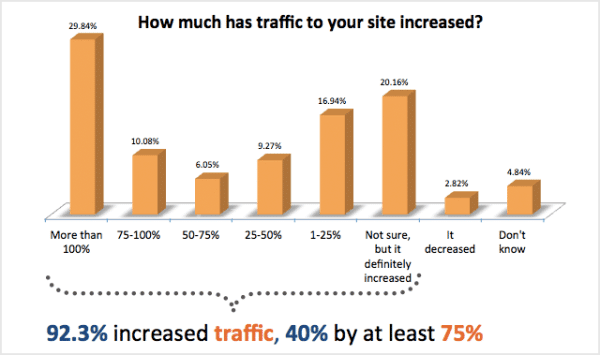Many small business owners are reluctant to start a blog. They look at what they do and assume it is not glamorous enough to blog about. However, every type of industry has its audience—the only real trick is to know how to connect the two.
Creating a blog for your business is crucial for promoting what you do. From newspapers to TV, companies have always used available media channels to reach the public.
Blogging is just a contemporary version of that – and it helps you establish a more direct and personal connection with your ideal customer.
If you’re still not convinced, here are some statistics:
- 57% of marketers revealed that they have gained customers specifically because of their blogs.
- Businesses that prioritize blogging are more likely to see 13X positive ROI.
- Businesses with blogs get 67% more leads than those without.
- 61% of US consumers have purchased as a result of a blog.
- Businesses that blog attract 55% more visitors than those that don’t.
As you can see, explaining who you are and what you do in blog form has numerous advantages. Here are five of the biggest draws.
1. Start a blog to strengthen relationship with customers
The old saying goes: “Trust is the real currency of business.” The Internet, however, is an unreliable place. To establish trust online, you need that authentic personal connection—which is why as many as 61% of buyers strongly rely on online reviews before buying anything.
This is important because buyers feel at ease when they transact with trustworthy brands. Once you establish that trust, not only will you attract new business, you are also more likely to get return customers.
A blog will help you build trust and credibility. If your prospects know that you provide authentic and valuable content, they are more likely to embark on a customer journey that will ultimately result in a purchase.
Perhaps the most obvious thing you can do is to produce content that will not only perform well in organic search and get a lot of social shares, but also establish your expertise and create a small community online.
Ideally, this type of content should not include many calls-to-action. This means that you should not create just content with the explicit purpose of making a sale.
Once you have created a sense of community with your brand’s blog, customers and prospects will feel inclined to use your products.
Think of Airbnb, for example, which labels itself as the ultimate destination experience. Its boom was a result of fostering that sense of community of like-minded people.
2. Improves Website Ranking
Blogs are incredibly beneficial for SEO. When you optimize your blog posts, you are making your business more visible to customers and prospects who are searching for keywords associated with your products on search engines.

Optimizing your blog posts previously meant stuffing your posts with as many keywords as possible in the hopes they will generate traffic. However, search engines are making it clear with every upgrade that you should be writing for people first.
Bombarding consumers with content that isn’t relevant or helpful in any way won’t get you anywhere, and might even drive potential customers away. Instead, providing information of value while focusing on a few long-tail keywords that you include in specific parts of your posts is a better way to go.
If your goal is to appeal to consumers (B2C), you will need to use different strategies than if you want to sell directly to other businesses (B2B).
Anna Gotter from Disruptive Advertising puts it like this: “While B2C customers shop to improve their lives, B2B customers are purchasing to improve their business, and most importantly, their bottom line.”
In other words, B2C customers are often more likely to be buying items for personal use. They will want to see results and testimonials from other people, and they will want them now.
B2B customers, on the other hand, will go to greater lengths to educate themselves about the product and its long-term benefits on their business.
Think of buying a laptop, for example. The decision-making process will be much different if you’re buying one for yourself than if you’re buying them for your entire office.
In both cases, you will want to know the benefits of the products, but the stakes will be higher in B2B. The content you put out will have to reflect that.
3. Increases Engagement
There are now over 3 billion social media users worldwide. The people you want to sell your business to are among them. Not getting social shares means missing out on perhaps the fastest, least expensive way to reach almost half of the world’s population.
Having a blog allows you to share something on your social channels and create some engagement around it. However, only valuable content can make it far enough.
Today, most small businesses that succeed in content marketing use a three-step model:
- Map out the pain point
- Select appropriate content for the problem
- Map it to people who have the problem
Removing the focus from the marketer to the buyer, this model lets you cater to the people with the right problem. Once your content solves their problem, your customers will almost certainly share it with new people. This will prove your expertise and grow your audience.
In the process, social media lets your users create content for you, and user-generated content gets more leads and traffic for your business.
For example, the National Geographic generated over 70,000 posts with their #wanderlustcontest campaign.
4. Growing an Email List
Email and social media marketing help generate leads, but proper content marketing means better results.
Businesses that blog generate 126% more leads. If you attract web visitors with interesting content, you eliminate ad costs.

Moreover, a business blog doesn’t just attract new visitors; it gives them a reason to come back another time. This allows you to capitalize on their interest by capturing their emails and sending them a newsletter.
As they learn about your service, you can convert them to buyers. This becomes possible when you introduce calls-to-action throughout your blogs.
For example, if you link your landing pages to get visitors to fill out forms, or include pop-up newsletters and relevant upsells within your blog posts, these simple calls-to-action help foster that connection.
5. Helps Businesses to Become Industry Leaders
Consistent and high-quality blog posts will position your business as an industry leader. Educating customers on topics that resonate with your market demonstrates your knowledge of your industry and showcases your skills.
This is especially true for SaaS businesses or startups with innovative and little-known solutions or products. Educating consumers about the benefits of using what you offer is an essential part of your work.
To draw attention to your very specific and niched solution that no one knows about, you need to cast your content-net wide and far. The best way to do so is by writing well-researched blog posts about topics your targeted audience is interested in.
Once you have their attention, you can gently nudge the customers down the sales funnel by convincing them of the benefits of your products and services.
In the process, you are building trust not only among new customers but existing customers too. As a small business just starting out and building your reputation, content marketing and blogging are powerful weapons to show you can contend with the big players.
The more you demonstrate your knowledge in the field, the more customers will rely on your products.
Conclusion
Blogging doesn’t cost a lot. However, it requires time and research and a good strategy.
All that effort will pay off in more ways than one. Your blog places your business in the limelight and lets you generate leads in exchange for answering the more pertinent questions your audience is asking.
Not only is it a great chance to generate new business—it’s an excellent way to maintain customers and build your brand and reputation too.
Guest Post By — Ashley Wilson
Ashley Wilson is a content creator, writing about business and tech. She has been known to reference movies in casual conversation and enjoys baking homemade treats for her husband and their two felines, Lady and Gaga. You can get in touch with Ashley via Twitter.


